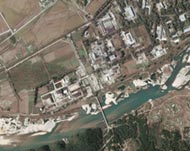US, Japan press for N Korea sanctions
The United States and Japan have vowed to punish North Korea for its missile tests, despite Chinese and Russian resistance to their push for tough UN sanctions on Pyongyang.

US envoy Christopher Hill, on a whirlwind tour after the missile launches, called for China to close ranks with Washington after receiving a lukewarm response from Beijing on Friday.
“We had very good discussions with the Chinese and made very clear our very deep concerns about what is going on in the DPRK, and I called upon the Chinese to understand that we will be much more effective if we speak with one voice,” Hill told reporters in Seoul, his second stop.
The United States, however, also reached out to North Korea, saying it was ready to sit down one-on-one if the communist state returned to multinational talks on its nuclear and missile programmes.
Blunt message
Taro Aso, the Japanese foreign finister, was more blunt, pledging not to give in to Russian and Chinese opposition to Japan’s draft Security Council resolution that condemns the tests and invokes Chapter 7 of the UN charter, which could clear the way for sanctions or even military action.
The Washington-backed Tokyo draft would block the transfer of items to the North that could be used in missile and weapons of mass destruction programmes.
“We may amend the draft, but we are firm on the binding resolution that includes sanctions,” Aso said in a speech in Osaka. “Japan will not compromise. We will go all the way.”
 |
|
N Korea had agreed to give up its |
“It is unreasonable if the moods of the veto powers dominate diplomacy,” he said of Moscow’s and Beijing’s Security Council prerogatives.
South Korea, which suspended crucial food aid to North Korea in response to the missile tests, expressed caution over the move to punish Pyongyang, saying the focus should be on engaging the communist regime.
North Korea, officially known as the Democratic People’s Republic of Korea (DPRK), fired seven missiles on Wednesday, including, for the first time, a long-range Taepodong-2 which quickly crashed into the Sea of Japan (East Sea).
China, North Korea’s neighbour and main ally, and Russia have both warned against further isolating Pyongyang, which is already under a barrage of sanctions.
Warning
Han Song-Ryol, the North’s deputy ambassador to the United Nations, has warned that UN sanctions will be an “act of war.”
In an interview with South Korea’s Yonhap news agency, Han said Pyongyang would return to talks if Washington lifted separate sanctions on a Macau bank accused of money laundering and counterfeiting on its behalf.
The financial sanctions led North Korea in November to boycott six-nation disarmament talks, just two months after it agreed in general terms to give up its nuclear programme in exchange for security guarantees and aid.
Diplomacy
The United States on Saturday rejected the demand.
|
“It’s time to focus on diplomacy rather than coercive measures” Chun Yung-Woo, South Korean envoy to the six-nation talks |
“To be very frank, I think this is not a time for so-called gestures of that kind,” Hill said.
But he said he would be ready to meet North Korea separately if it returned to the six-nation talks, including a potential informal round Beijing is hoping to organise this month in the city of Shenyang.
“I just can’t do it when they are boycotting the six-party talks,” Hill said.
Chun Yung-Woo, Hill’s South Korean counterpart in the stalled talks, expressed hope that Wu Davei, China’s delegate and vice-foreign minister, could arrange the Shenyang talks when he travelled to Pyongyang in the coming week.
“It’s time to focus on diplomacy rather than coercive measures,” Chun said.